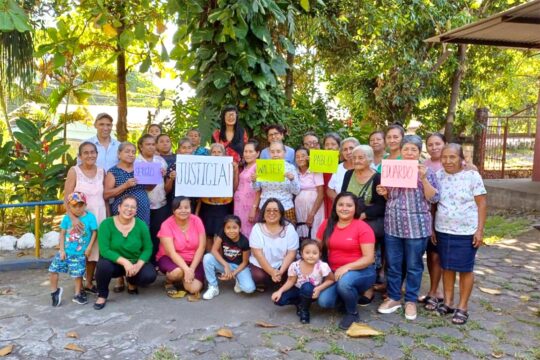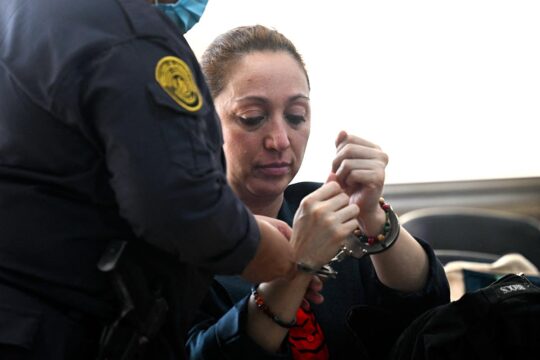The remarkable progress Guatemala has made in prosecuting corruption and abuse could be reversed if the country’s highest courts don’t stop the egregious delays that are keeping powerful defendants from going to trial, Human Rights Watch said in a report released today.
The 56-page report, “Running Out the Clock: How Guatemala’s Judiciary Could Doom the Fight against Impunity,” documents a pattern of repeated and unjustifiable delays in criminal cases brought by the International Commission against Impunity in Guatemala (CICIG) and the Guatemalan Attorney General’s Office.
“The fight against impunity in Guatemala has reached a critical moment,” said Daniel Wilkinson, managing director for the Americas at Human Rights Watch. “After surviving desperate efforts by the president and congress to sabotage its work, the UN-sponsored commission investigating corruption and abuse must now contend with a judicial branch whose failures could prevent its most critical cases from ever going to trial.”
In August 2017, President Jimmy Morales ordered the expulsion of the CICIG commissioner, Iván Velásquez. In September, Congress sought to eviscerate the laws that CICIG and the Attorney General’s Office are using to prosecute cases of corruption and abuse of power. The Constitutional Court blocked both efforts, after tens of thousands of Guatemalans took to the street in protest and the human rights ombudsman filed appeals.
Since CICIG began operation in 2007, Guatemala has made enormous progress in promoting accountability for abuses of power. The most dramatic breakthrough came in 2015, when the joint efforts of CICIG and local prosecutors exposed multiple corruption schemes, implicating officials in all three branches of government, and prompting the resignation and arrest of then-President Otto Pérez Molina.
Yet, more than two years on, these prosecutions have joined a growing list of cases against powerful defendants in which criminal cases have been bogged down in pretrial proceedings, some for more than five years.
Human Rights Watch extensively reviewed criminal proceedings in eight high-profile cases and interviewed dozens of judges, prosecutors, lawyers, and CICIG investigators familiar with these cases. It found a consistent pattern in which defense lawyers are able to trigger prolonged delays with repeated, often unjustified, appeals to court decisions and petitions seeking the recusal of judges.
Guatemalan law sets clear limits on the amount of time courts have to address these appeals, but the courts routinely fail to comply with those limits.
In one case, a former national police director and former deputy minister of the interior was charged in 2012 with ordering the execution of suspected criminals. Five-and-a-half years later, the case has yet to go to trial. It was stalled for more than three years as a result of repeated recusal petitions, against the same judge, that rehashed arguments that had already been rejected. Appellate courts regularly failed to meet the applicable deadlines.
This problem is not limited to CICIG’s cases but also affects others pursued by local prosecutors without the commission’s help, including the prosecution of the former dictator, Efraín Rios Montt, for genocide. Nor is this a recent problem. Cases involving human rights atrocities have suffered similar setbacks in the past.
CICIG has a mandate to operate in Guatemala until September 2019. Attorney General Thelma Aldana’s term expires in May 2018.
“If defendants are able to run out the clock on the commission’s mandate – or even just on the attorney general’s term in office – the efforts to prosecute these cases could fail, and the forces of corruption and impunity in the country could emerge stronger than ever,” Wilkinson said.
Courts generally fail to adhere to the time limits for resolving appeals established in Guatemalan law. Appeals that should be resolved within a month routinely take 6 to 12 months. The impact of missed deadlines is compounded by egregious bureaucratic delays. Judges routinely neglect to re-schedule promptly proceedings that have been suspended or postponed because of appeals or other disruptions, such as the failure of defense lawyers to show up for a hearing.
The courts have, but do not use, powers that could allow them to avoid many of the worst delays without prejudicing the rights of defendants, Human Rights Watch said. Judges can decline to hear unfounded appeals and courts can continue with proceedings while appeals are pending – so long as there is no risk of irreparable harm. But this seldom happens.
Guatemala’s Supreme Court is among the worst offenders. In two of the cases from 2015, the Supreme Court took nine months to resolve appeals that should have been decided within a month. The court has also failed to use its authority to ensure that lower court judges comply with the legally mandated deadlines.
The Constitutional Court has played a decisive role in 2017 in shielding CICIG from efforts by Morales and Congress to sabotage its work. But it has also been responsible for some of the longest delays. It took 18 months to resolve one appeal documented in the report and almost 22 months for another.
“Working with CICIG in recent years, the Attorney General’s Office has grown into a credible institution, capable of prosecuting corrupt officials and powerful mafias once considered untouchable,” Wilkinson said. “But for Guatemala to make real progress in fighting impunity it needs more than investigations and arrests. It also needs courts that are able to bring trials to a conclusion.”
Cases Reviewed in the Report:
- Corrupt Military Officers Case: Eight former Defense Ministry officials were charged in 2009 with embezzling more than US$70 million from the government. Eight years later, the case has yet to go to trial. Almost all courts involved in the case failed to meet the applicable deadlines, including the Constitutional Court, which took 18 months to rule on one appeal.
- Blanco Lapola Case: A former national police director and former deputy minister of the interior was charged in 2012 with ordering the execution of suspected criminals. Five-and-a-half years later, the case has yet to go to trial. The case was stalled for more than three years as a result of repeated recusal petitions against the same judge that rehashed arguments that had already been rejected. Appellate courts regularly failed to meet the applicable deadlines.
- La Línea Case: Former President Otto Perez Molina and former Vice President Roxana Baldetti were charged along with 28 other officials for allegedly organizing a scheme to defraud the customs authority by collecting bribes instead of customs duties. More than two years later, the case has not gone to trial. It was held up for about a year-and-a-half because of delays in rescheduling hearings promptly after repeated disruptions caused by – among other things – the failure of defendants or their lawyers to show up in court.
- Impunity Law Firm Case: A judge was charged with receiving a bribe to impose conditional liberty instead of pretrial detention for three suspects arrested in the La Línea case. More than two years later, the case has not yet gone to trial. Recusal petitions held up the case for more than a year.
- Phantom Jobs Case: A former president of Congress was charged with hiring people in Congress who never performed any work for that institution, and pocketing those wages himself. More than two years later, the case has not yet gone to trial. Delays in rejecting a recusal petition presented by a defendant held up the case for almost 15 months.
- Genocide Case: Former dictator Efraín Rios Montt was charged in 2012 with genocide for the mass slaughter of Mayan communities in the early 1980s. He was convicted in 2013, but the Constitutional Court nullified the verdict and ordered a new trial. After a delay of more than two years, mostly caused by the slow rescheduling of the trial, a court ruled in 2015 that Ríos Montt’s deteriorating mental health had left him unfit for a regular trial, and ordered that he instead be subject to special proceedings that do not allow for a guilty verdict. After two more years of delay, of which one year was due to the Constitutional Court not respecting a deadline, these proceedings only began in October.
- Myrna Mack Case: Three former military intelligence officers were charged in 1996 for the 1990 assassination of anthropologist Myrna Mack Chang. One defendant was convicted and two were acquitted in 2002, 11 years after they were charged. Courts repeatedly failed to respect deadlines in at least 12 constitutional appeals as well as in the numerous other appeals and recusal petitions that were filed.
- Dos Erres Case: Seventeen soldiers were charged in 1999 and 2000 for a massacre in 1982. Five of them were convicted in 2011 and 2012, 12 years after the first arrests were made. Courts took more than three years to resolve five constitutional appeals.




